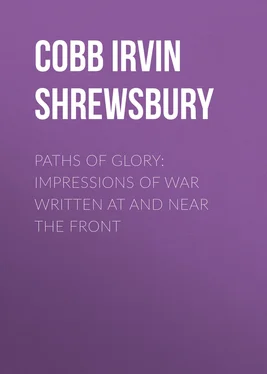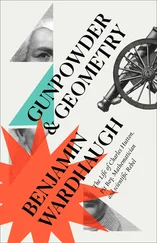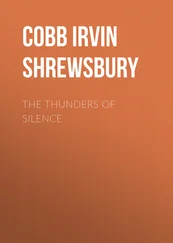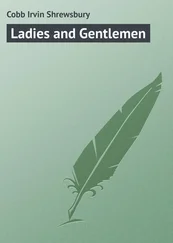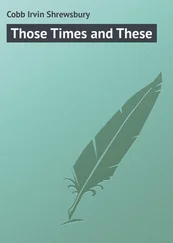Irvin Cobb - Paths of Glory - Impressions of War Written at and Near the Front
Здесь есть возможность читать онлайн «Irvin Cobb - Paths of Glory - Impressions of War Written at and Near the Front» — ознакомительный отрывок электронной книги совершенно бесплатно, а после прочтения отрывка купить полную версию. В некоторых случаях можно слушать аудио, скачать через торрент в формате fb2 и присутствует краткое содержание. Жанр: prose_military, История, foreign_edu, foreign_antique, foreign_prose, на английском языке. Описание произведения, (предисловие) а так же отзывы посетителей доступны на портале библиотеки ЛибКат.
- Название:Paths of Glory: Impressions of War Written at and Near the Front
- Автор:
- Жанр:
- Год:неизвестен
- ISBN:нет данных
- Рейтинг книги:3 / 5. Голосов: 1
-
Избранное:Добавить в избранное
- Отзывы:
-
Ваша оценка:
- 60
- 1
- 2
- 3
- 4
- 5
Paths of Glory: Impressions of War Written at and Near the Front: краткое содержание, описание и аннотация
Предлагаем к чтению аннотацию, описание, краткое содержание или предисловие (зависит от того, что написал сам автор книги «Paths of Glory: Impressions of War Written at and Near the Front»). Если вы не нашли необходимую информацию о книге — напишите в комментариях, мы постараемся отыскать её.
Paths of Glory: Impressions of War Written at and Near the Front — читать онлайн ознакомительный отрывок
Ниже представлен текст книги, разбитый по страницам. Система сохранения места последней прочитанной страницы, позволяет с удобством читать онлайн бесплатно книгу «Paths of Glory: Impressions of War Written at and Near the Front», без необходимости каждый раз заново искать на чём Вы остановились. Поставьте закладку, и сможете в любой момент перейти на страницу, на которой закончили чтение.
Интервал:
Закладка:
As we trail along behind him in single file we pass a small paved court before a stable and see a squad of French prisoners. Later we are to see several thousand French prisoners; but now the sight is at once a sensation and a novelty to us. These are all French prisoners; there are no Belgians or Englishmen among them. In their long, cumbersome blue coats and baggy red pants they are huddled down against a wall in a heap of straw. They lie there silently, chewing straws and looking very forlorn. Four German soldiers with fixed bayonets are guarding them.
The young lieutenant leads us along a steeply ascending road over a ridge and then stops; and as we look about us the consciousness strikes home to us, with almost the jar of a physical blow, that we are standing where men have lately striven together and have fallen and died.
In front of us and below us is the town, with the river winding into it at the east and out of it at the west; and beyond the town, to the north, is the cup-shaped valley of fair, fat farm lands, all heavy and pregnant with un-garnered, ungathered crops. Behind us, on the front of the hill, is a hedge, and beyond the hedge—just a foot or so back of it, in fact—is a deep trench, plainly dug out by hand, and so lately done that the cut clods are still moist and fresh-looking. At the first instant of looking it seems to us that this intrenchment is full of dead men; but when we look closer we see that what we take for corpses are the scattered garments and equipments of French infantrymen—long blue coats; peaked, red-topped caps; spare shirts; rifled knapsacks; water- bottles; broken guns; side arms; bayonet belts and blanket rolls. There are perhaps twenty guns in sight. Each one has been rendered useless by being struck against the earth with sufficient force to snap the stock at the grip.
Almost at my feet is a knapsack, ripped open and revealing a card of small china buttons, a new red handkerchief, a gray-striped flannel shirt, a pencil and a sheaf of writing paper. Rummaging in the main compartment I find, folded at the back, a book recording the name and record of military service of one Gaston Michel Miseroux, whose home is at Amiens, and who is—or was—a private in the Tenth Battalion of the – Regiment of Chasseurs a Pied. Whether this Gaston Michel Miseroux got away alive without his knapsack, or whether he was captured or was killed, there is none to say. His service record is here in the trampled dust and he is gone.
Before going farther the young lieutenant, speaking in his broken English, told us the story of the fight, which had been fought, he said, just forty-eight hours before. "The French," he said, "must have been here for several days. They had fortified this hill, as you see; digging intrenchments in front for their riflemen and putting their artillery behind at a place I shall presently show you. Also they had placed many of their sharpshooters in the houses. It was a strong position, commanding the passage of the river, and they should have been able to hold it against twice their number.
"Our men came, as you did, along that road off yonder; and then our infantry advanced across the fields under cover of our artillery fire. We were in the open and the French were above us here and behind shelter; and so we lost many men.
"They had mined the bridge over the canal and also the last remaining bridge across the river; but we came so fast that we took both bridges before they could set off the mines.
"In twenty minutes we held the town and the last of their sharpshooters in the houses had been dislodged or killed. Then, while our guns moved over there to the left and shelled them on the flank, two companies of Germans—five hundred men—charged up the steep road over which you have just climbed and took this trench here in five minutes of close fighting.
"The enemy lost many men here before they ran. So did we lose many. On that spot there"—he pointed to a little gap in the hedge, not twenty feet away, where the grass was pressed flat—"I saw three dead men lying in a heap.
"We pushed the French back, taking a few prisoners as we went, until on the other side of this hill our artillery began to rake them, and then they gave way altogether and retreated to the south, taking their guns. Remember, they outnumbered us and they had the advantage of position; but we whipped them—we Germans—as we always do whip our enemies."
His voice changed from boasting to pity:
"Ach, but it was shameful that they should have been sent against us wearing those long blue coats, those red trousers, those shiny black belts and bright brass buttons! At a mile, or even half a mile, the Germans in their dark-gray uniforms, with dull facings, fade into the background; but a Frenchman in his foolish monkey clothes is a target for as far as you can see him.
"And their equipment—see how flimsy it is when compared with ours! And their guns—so inferior, so old-fashioned alongside the German guns! I tell you this: Forty-four years they have been wishing to fight us for what we did in 1870; and when the time comes they are not ready and we are ready. While they have been singing their Marseillaise Hymn, we have been thinking. While they have been talking, we have been working."
Next he escorted us back along the small plateau that extended south from the face of the bluff. We made our way through a constantly growing confusion of abandoned equipment and garments—all the flotsam and jetsam of a rout. I suppose we saw as many as fifty smashed French rifles, as many as a hundred and fifty canteens and knapsacks.
Crossing a sunken road, where trenches for riflemen to kneel in and fire from had been dug in the sides of the bank—a road our guide said was full of dead men after the fight—we came very soon to the site of the French camp. Here, from the medley and mixture of an indescribable jumble of wreckage, certain objects stand out, as I write this, detached and plain in my mind; such things, for example, as a straw basket of twelve champagne bottles with two bottles full and ten empty; a box of lump sugar, broken open, with a stain of spilled red wine on some of the white cubes; a roll of new mattresses jammed into a natural receptacle at the root of an oak tree; a saber hilt of shining brass with the blade missing; a whole set of pewter knives and forks sown broadcast on the bruised and trampled grass. But there was no German relic in the lot —you may be sure of that. Farther down, where the sunken road again wound across our path, we passed an old-fashioned family carriage jammed against the bank, with one shaft snapped off short. Lying on the dusty seat-cushion was a single silver teaspoon.
Almost opposite the carriage, against the other bank, was a cavalryman's boot; it had been cut from a wounded limb. The leather had been split all the way down the leg from the top to the ankle, and the inside of the boot was full of clotted, dried blood. And just as we turned back to return to the town I saw a child's stuffed cloth doll—rag dolls I think they call them in the States—lying flat in the road; and a wagon wheel or a camion wheel had passed over the head, squashing it flat.
I am not striving for effect when I tell of this trifle. When you write of such things as a battlefield you do not need to strive for effect. The effects are all there, ready-made, waiting to be set down. Nor do I know how a child's doll came to be in that harried, uptorn place. I only know it was there, and being there it seemed to me to sum up the fate of little Belgium in this great war. If I had been seeking a visible symbol of Belgium's case I do not believe I could have found a more fitting one anywhere.
Going down the hill to the town we met, skirting across our path, a party of natives wearing Red Cross distinguishments. The lieutenant said these men had undoubtedly been beating the woods and grain fields for the scattered wounded or dead. He added, without emotion, that from time to time they found one such; in fact, the volunteer searchers had brought in two Frenchmen just before we arrived—one to be cared for at the hospital, the other to be buried.
Читать дальшеИнтервал:
Закладка:
Похожие книги на «Paths of Glory: Impressions of War Written at and Near the Front»
Представляем Вашему вниманию похожие книги на «Paths of Glory: Impressions of War Written at and Near the Front» списком для выбора. Мы отобрали схожую по названию и смыслу литературу в надежде предоставить читателям больше вариантов отыскать новые, интересные, ещё непрочитанные произведения.
Обсуждение, отзывы о книге «Paths of Glory: Impressions of War Written at and Near the Front» и просто собственные мнения читателей. Оставьте ваши комментарии, напишите, что Вы думаете о произведении, его смысле или главных героях. Укажите что конкретно понравилось, а что нет, и почему Вы так считаете.
